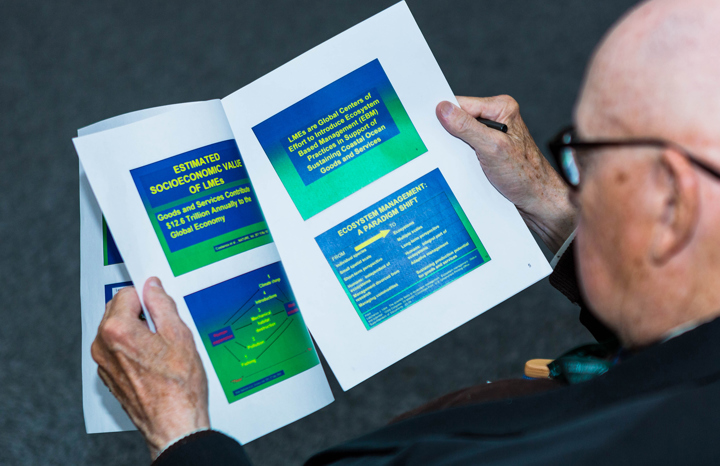Dr. Kenneth Sherman, co-founder of the LME concept, receives IOC/UNESCO's prestigious N.K. Panikkar Memorial Medal
Dr. Sherman's lecture entitled "Pathway to Sustaining the World's Large Marine Ecosystems" describes the approach to assessing and managing coastal ocean marine resources within the spatial domains of the world's LMEs, located along the margins of the continents. Each year, the LMEs produce 80% of the world's marine fisheries catch and contribute an estimated US$27.7 trillion in ecosystem services annually to the global economy. Dr. Sherman is an adjunct Professor of Oceanography, Coastal Resources Center, Graduate School of Oceanography, University of Rhode Island
The LME concept was developed by Dr. Sherman in collaboration with his former colleague, now deceased, Professor Lewis Alexander of the University of Rhode Island in the mid-1980s. During the past 39 years, the LME approach has successfully applied a 5-module series of natural science and social science indicators of changing conditions of LME 1. Productivity 2. Fish and Fisheries 3. Pollution and Ecosystem Health 4. Socio-economics and 5. Governance.
The LME approach encompasses five modules focusing on productivity, fish and fisheries, pollution and ecosystem health, socioeconomics, and governance, and offers an effective framework for managing resources within ecologically-bounded transnational areas. Since 1997, the IOC/UNESCO has actively promoted the LME concept, contributing to the formulation and implementation of LME projects financed by the Global Environment Facility (GEF).
Dr. Sherman was awarded the medal for his contributions to leading a global effort to implement LME assessment and management programs in 125 economically developing countries in Africa, Asia, Latin America, and Eastern Europe. Since 1995, the GEF has provided $6.01 billion in catalytic financial assistance to support LME programs in developing countries for reducing human and natural stressors on the sustainable development of marine resources.
Scientific and technical assistance is being provided to these LME programs by 5 United Nations agencies, United Nations Development Program (UNDP), UN Environment Program (UNEP), UN Industrial Development Organization (UNIDO), UN Food and Agriculture Organization (FAO), and the IOC-UNESCO, and four countries with advanced economies including the United States (NOAA-Fisheries), Norway (NORAD), Sweden (SIDA), and Germany (ZMT).
The lecture was transmitted via video from Rhode Island to the U.N Ocean Assembly, followed by a question and answer session with the Assembly participants', conducted via Zoom. The United States Representative to the Assembly, Nicole Leboeuf, assistant administrator of NOAA, received the medal on behalf of Dr. Sherman. View/download the slide presentation and transcript of the lecture.


























